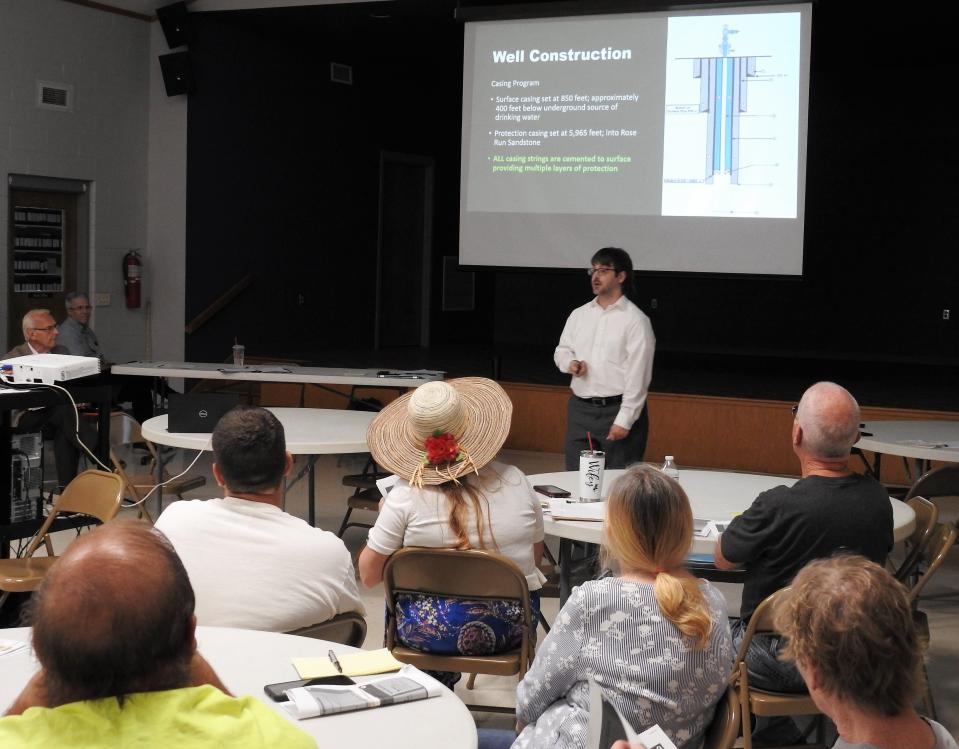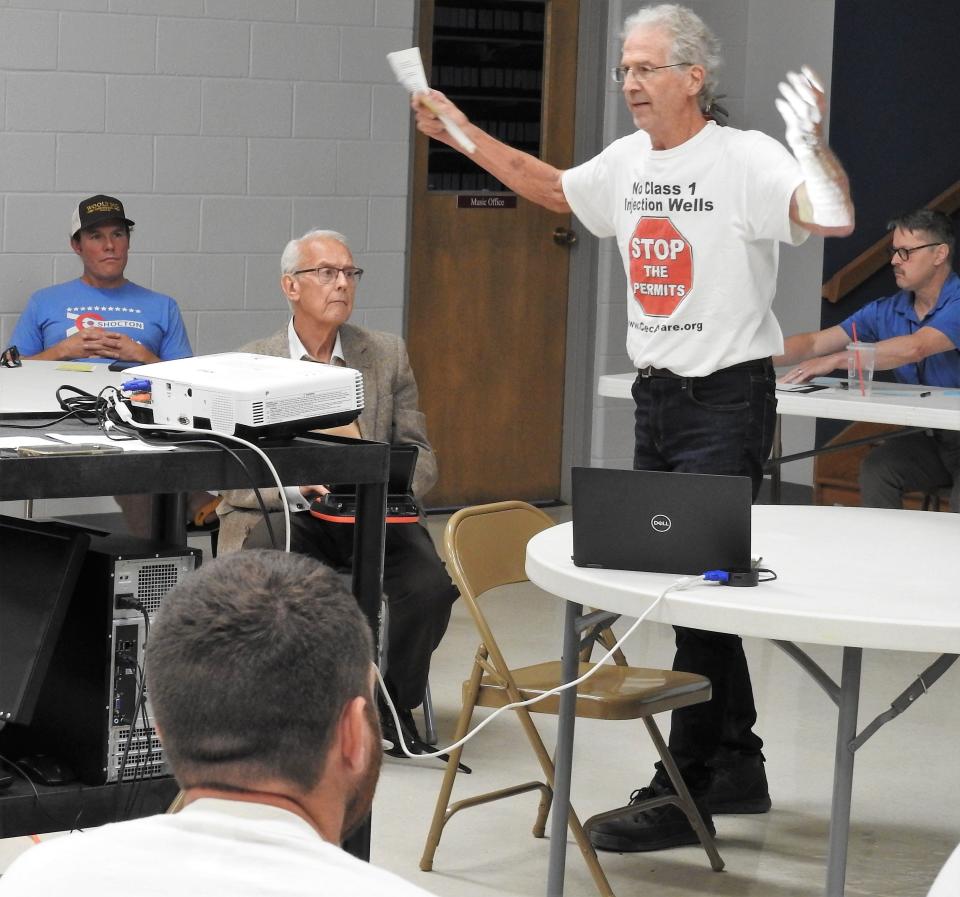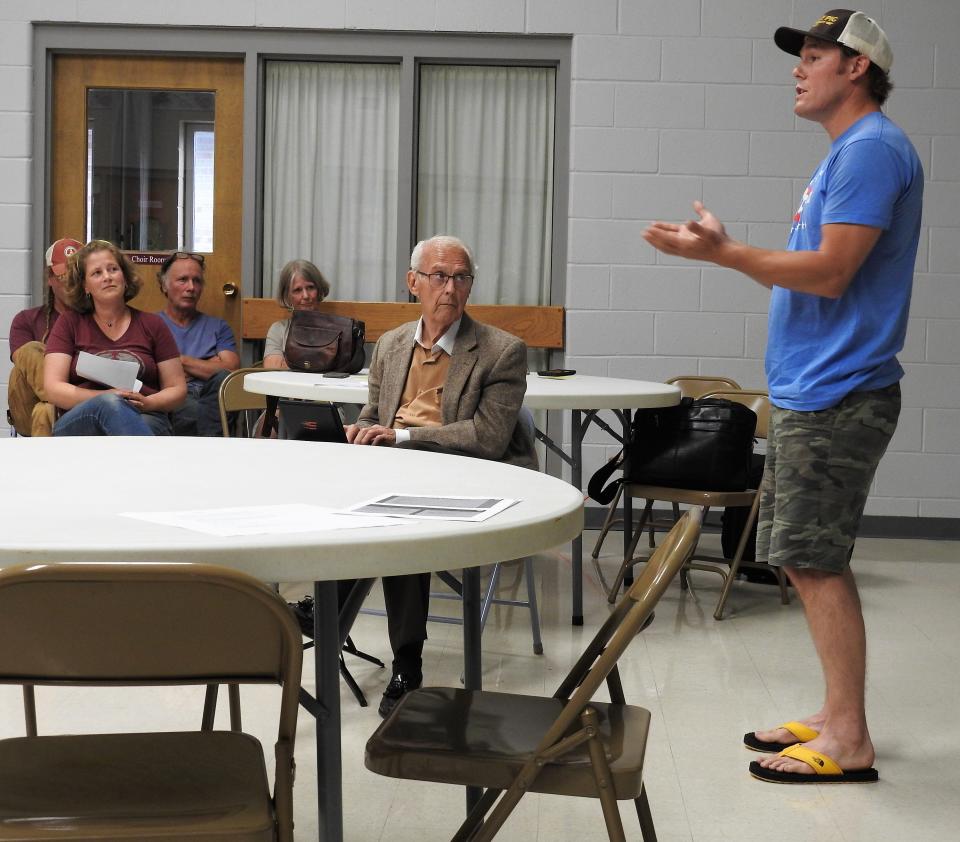Public speaks out against another injection well during an Ohio EPA hearing
COSHOCTON − Several community residents let it be known they're against Buckeye Brine installing a fourth injection well at its facility at 23986 Airport Road, during a hearing by the Ohio Environmental Protection Agency.

An informational and feedback session was held recently at Roscoe United Methodist Church. More than 60 people attended the meeting with 13 providing official comment for the record. There was a presentation on the permit being sought by EPA officials and a question-and-answer period. Nobody at the meeting spoke in support of the permit. The deadline for written comment was July 7.
Buckeye Brine is seeking a permit to drill application for construction of a new Class I, non-hazardous injection well. After construction, Buckeye Brine would need to submit a separate permit for operation. Steve Mobley, president of Buckeye Brine, did not respond to an email and phone call from the Tribune.
The business opened in 2012 with three operating wells. In 2018, the facility sought approval from the Ohio Environmental Protection Agency to reclassify two of its wells from Class II to Class I.
This meant it could go from accepting only brine water as a byproduct from hydraulic fracturing by the oil and gas industry to other forms of non-hazardous waste from industrial and municipal clients. Permits were approved in July 2019. The first well began taking Class I materials that December and the other well about a year later.
Ohio EPA said the proposed new well would inject into deep, isolated rock formations thousands of feet below the lowermost underground source of drinking water. The injection zone is separated from aquifers by an impermeable cap rock called the confining layer, along with additional layers of permeable and impermeable rock and sediment.
The Ohio EPA said Buckeye Brine must continuously monitor well operations, such as injection and pressure, to ensure proper operation and provide monthly reports of tests to the Ohio EPA. If the tests or continuous monitoring indicate a problem, Buckeye Brine will have to cease injection, assess the situation and, if necessary, repair or abandon the well. This is the same for all their wells.

Public comment
Most of the questions asked by the public during the meeting were related to safety, liability and who would be responsible for anything that might go wrong. This was the primary concern of Mayor Mark Mills, who also asked the EPA officials present if they would want an injection well facility in their backyard.
The City of Coshocton is positioning itself as a regional water authority. It's currently providing water and water services to West Lafayette. A similar expansion to Warsaw is underway and Conesville might be next. Any infiltration of the city's water reservoir would be devastating.
"What goes into the ground doesn't disappear," Mills said. "The City of Coshocton and Coshocton County won't be left holding the bag. Who is going to put up the money to guarantee we have safe drinking water for multiple generations to come?"
Also expressing clean water concerns were Kevin Ely and Jael Malenke, owners of Wooly Pig Farm Brewery. Water is crucial to their beer making process.
"We depend on quality of water in Coshocton County for our livelihood. We're hoping our children will be here to depend on the quality of water for their livelihoods and our children's children, and if not for their livelihoods, then their lives," Malenke said. "I think as a community it's unconscionable for us to carry the risk, however small it is, for somebody else's benefit."

Another business owner providing comment was Camille McPeek, co-owner of Coshocton KOA Campground. She said she worked as a geologist for a few years and understands a bit about the issues with Buckeye Brine.
"To my Coshocton community, the EPA cannot protect us, our lawmakers can't protect us, so I guess it's up to us. Maybe we should come up with our disaster preparedness plan," she said. "The industrial waste industry is not for Coshocton. It's not for my town. We do not need any risk. Stop adding more injection wells in my town."
A longtime opponent of Buckeye Brine is Tim Kettler, a member of Coshocton Environmental and Community Awareness who also works in the wastewater treatment field. He wore a T-shirt reading "No Class 1 Injection Wells - Stop the Permits" saved from 2018. He's afraid one day it might read "No Class 1 Hazardous Wells."
"In 2018 and 2019, this community came together when Buckeye Brine first made its application to convert Class II saltwater injection wells to Class I, non-hazardous," Kettler reminded the room. "We educated ourselves. We became citizen scientists. We became community organizers. We brought together a petition we drafted ourselves with over 2,000 signatures and submitted it to (the EPA). We got an extra hearing from the EPA. We filled the high school. We spoke from our hearts. We spoke scientifically. We spoke logically. We spoke as a community."
However, it was all for naught and Kettler fears the same this time.
Erin Gotwals of Strawberry Hill Farm said there are many scenarios as to what the future might hold, but in all of them clean, safe drinking water is an essential need.
"We're fortunate to live in a part of the world where we've been able to take abundant clean water for granted. This will not always be the case. Things are changing and many of these changes are entirely out of our control, but this is one thing we can control," she said of the injection well permit. "The choices we make voluntarily to jeopardize our access to clean water is on us. It feels incredibly short sighted. Our kids will ask us why, what will we tell them?"
For more information on the permit, email ddagwcomments@epa.ohio.gov. A copy of the draft permit can be viewed online or by contacting the Ohio EPA's Southeast District Office at 740-385-8501.
Leonard Hayhurst is a community content coordinator and general news reporter for the Coshocton Tribune with more than 15 years of local journalism experience and multiple awards from the Ohio Associated Press. He can be reached at 740-295-3417 or llhayhur@coshoctontribune.com. Follow him on Twitter at @llhayhurst.
This article originally appeared on Coshocton Tribune: Public speaks out against injection well during an Ohio EPA hearing

